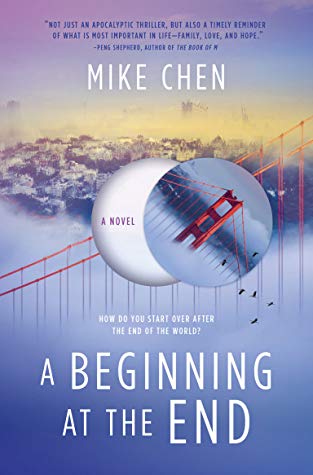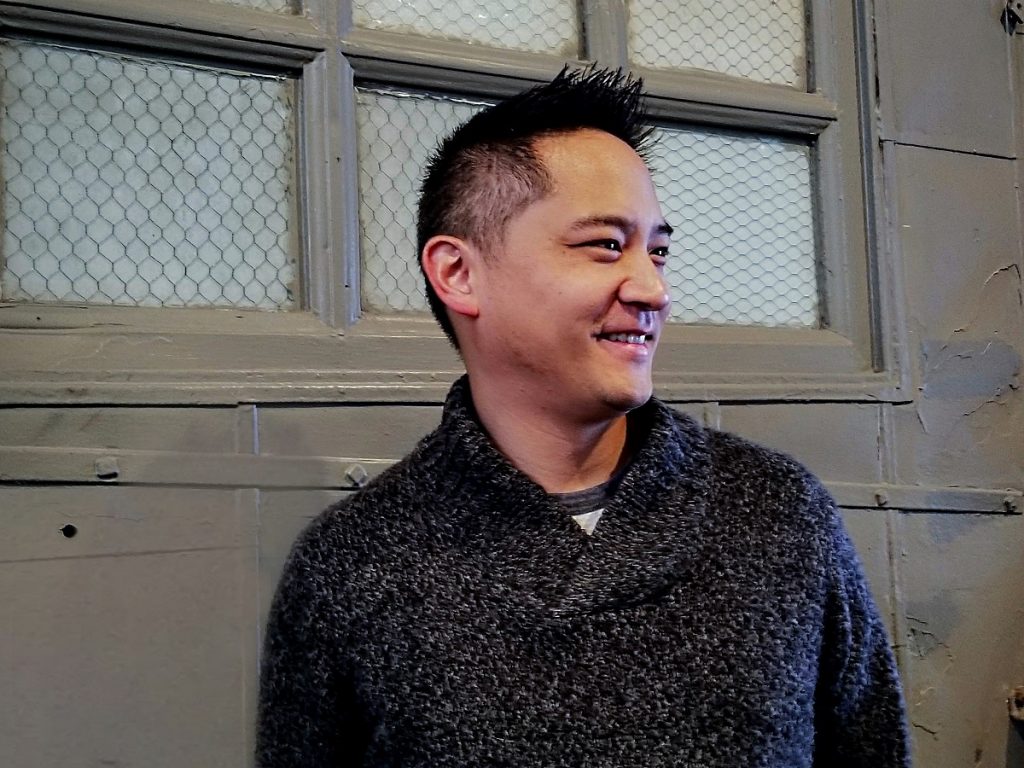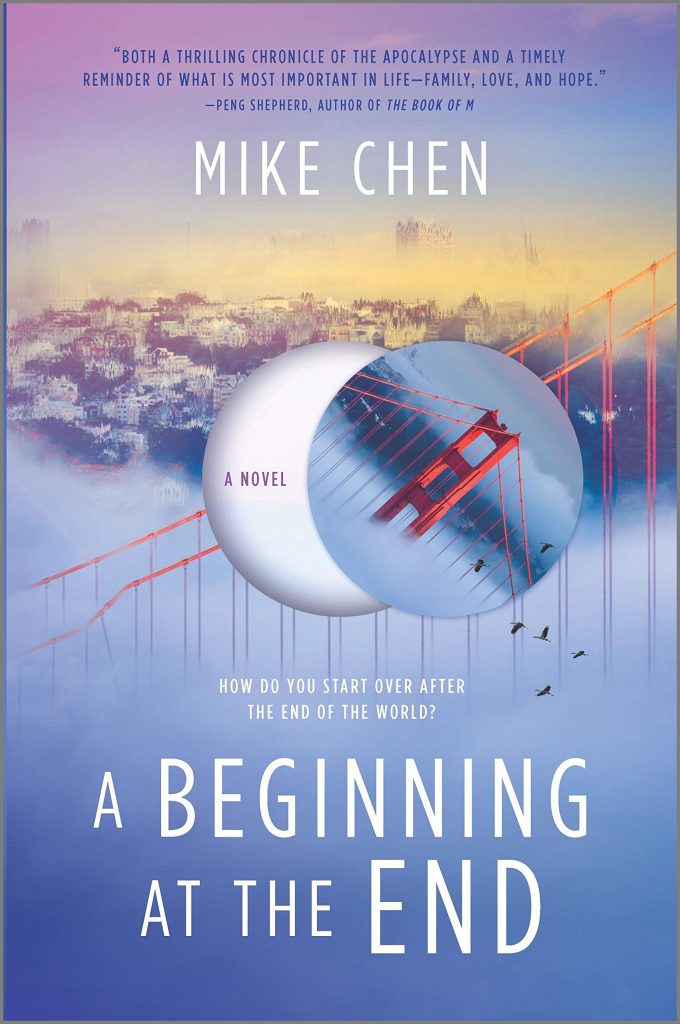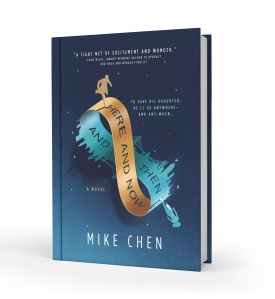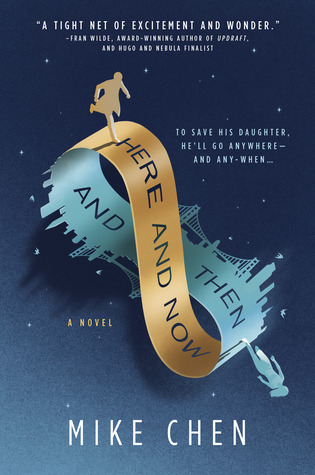Mike
Chen writes science fiction with feelings. His debut novel
Here and Now and Then was part of
Bookbub’s Best Science Fiction of 2019 and the Goodreads Choice
Awards shortlist. His upcoming book A
Beginning at the End (January 14,
2020 from Mira/HarperCollins) has received multiple starred reviews
from Publisher’s Weekly, Library Journal, and more. Mike also
covers geek culture for outlets such as Tor.com, StarTrek.com, and
more, and posts many photos of his dog on social media. Follow him on
Twitter/Instagram @mikechenwriter.
Tell me about
your writing process: schedule, environment, inspirations, magic
tricks, etc.
Well, I have a day
job and a feisty 5-year-old daughter, so my writing process is
basically whenever I can around that. I write a lot on my phone (and
I read a lot of ebooks on my phone) because Google Docs allows for
anywhere/anytime access. This works in whatever block of time is
available, so if I’m waiting at a doctor’s appointment, I can
edit a short section, and if I’m in bed, I can draft for 30 minutes
or so. At some point, I imagine I’ll have a little more structure
to my schedule, but I think it’ll have to wait until my daughter is
a little older and doesn’t want my company anymore! As for actual
process, I just need quiet (only video game soundtracks or
instrumentals if I have music), though someday I’d love to have a
dedicated home office just for writing.
Walk me through
your publishing process from “final” draft to final product,
including who does what when, and marketing that you do as the
author.
It’s pretty
standard. There’s the editorial process with my editor; then the
marketing/publicity side gets involved. I do a lot of freelance
writing for geek and pop culture media (e.g. Tor.com, StarTrek.com,
TheMarySue.com) so I’m always game if I need to write an essay or
something specifically for publicity purposes, but it’s generally
out of my control; I just nod and smile when asked to write something
or show up to an event.
A few steps back
from that, I find that I’m not one of those writers who can sell
with just a sample chapter and an outline. Writing a full novel from
that is far too daunting, but you don’t want to sink too much time
and energy into a manuscript that won’t go anywhere. For my second
contract, I’ve found a good happy medium to be writing a fairly
polished first half and a detailed synopsis for editorial
acquisition. That way I get a good sense of character and world but I
haven’t worked through the time necessary for a full manuscript.
And if/when they buy it, I’m in a good starting point to finish it
off because so much of the groundwork is already done.
Talk about your
support system online and IRL, especially your biggest cheerleaders.
My agent Eric Smith
is my biggest industry cheerleader. He’s probably the biggest
cheerleader in publishing, honestly. He cheers everyone on, which is
always good to have in those moments of self-doubt (there are many).
He’s also very editorial, which I appreciate in an agent. He lets
me bounce ideas off of him and provides early critique reads, even
for projects he’s not involved with. Oh, and he lets me know when
there are good sales on video games, which is very important!
My wife and
non-writer friends are all very supportive but the logistics of this
industry are so unique and weird that it’s hard for them to
empathize with the specific minutia of it all. I think for all
writers, it’s really important to get peers whom you can vent to in
private, and I am lucky that I have those. There are too many to
name, and I’m afraid I’d probably accidentally leave someone out,
but if you follow me on Twitter, you’ll see me interacting with a
lot of them—cheering each other on but also talking about geeky
stuff like Star Trek and video games.
How does life
influence your writing and vice versa?
Well, I realized the
other day that many of the relationships and characters I’ve
written about are lifted unknowingly from personal experience. There
are moments when you draw on that intentionally, like a scene that
looks like the coffee shop you like or the character that tells a
joke that your spouse did. And then there’s the realization that a
shade of a character is totally someone you know. I think every
writer deals with that, so everyday life certainly influences my
writing. I think it’s impossible not to.
From a conscious
perspective, a friend told me a few weeks back that my writing was
“hopepunk,” which is a term I recently discovered. A lot of my
worldbuilding choices and character demographics stem from crafting a
world that I want to see. As creators, we have a choice to bring some
level of normalization into the real world via exposure in our
imaginary world—I think that’s very vital. Even if a story isn’t
overtly political, the messages imbued in it are inherently charged
with a political point of view.
What do you love
most about your creativity?
I remember the first
creative writing class I took at UC Davis. I’d already done some
journalism at that point in my life, but I felt this strange sense of
freedom creating a fictional world. That creativity was unlike
anything I’d ever felt, and I ran with it. My teacher told me to
keep writing at the end of that class, and obviously I did.
That teacher, by the
way, is named Wendy Sheanin and she’s an executive at Simon &
Schuster. She’s the first person I sent an advance copy of my
debut.
Connect with
Mike:
www.mikechenbooks.com
www.twitter.com/mikechenwriter
www.instagram.com/mikechenwriter
